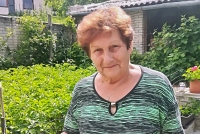You have to live on
Download image
Jiřina Srncová, née Klonfarová, was born to Jan Josef Klonfar and Barbora Klonfarová on 22 April 1942 in the village of Nový Bor in the Šumava mountain range that no longer exists. Soon after her birth, the family relocated to Obora near Nová Bystřice in the South Bohemian borderland. This is where the witness experienced the end of the war, liberation by the US Army, and the dangerous relocation of the Banderites. Since Obora was situated very close to the Austrian border, Jiřina Srncová and her family were forced to move in 1948 because the restricted zone of the Iron Curtain was built in the area. The family lost its house and land and the entire village was levelled. They moved from Obora to Šluknov where Jiřina Srncová completed her elementary school. Immediately after that, at age 14, she joined the Stap textiles factory in the nearby community of Vilémov as a worker. At age 15, she met her future husband Antonín Srnec who was serving in the military with the Border Guard in the Šluknov area. They married in 1959 and Jiřina moved to her husband’s native house in Boršice near Blatnice where they brought up two daughters. The witness was still living there in 2021.
